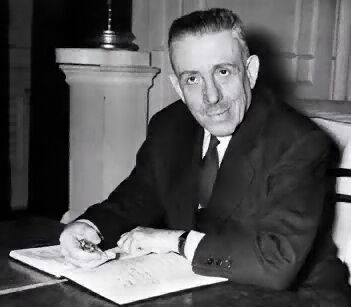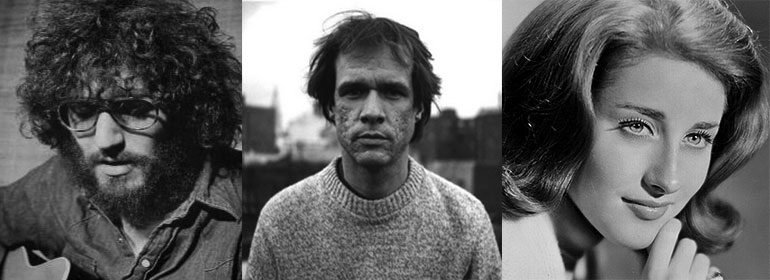Musician The Late David Turpin runs through his top five gay musicians that have influenced his music.
Like many gay people, I’ve spent a lot of time reading into songs, reading against songs, pulling the hidden meanings out, searching between the lines. It’s a wonderful thing, creative re-appropriation, but there’s another, rarer, experience that’s just as potent – maybe even more so. Growing up, and later working as a musician, some of the most exciting listening experiences I’ve had have been with other gay musicians, hearing the songs that seemed to speak directly to me, that didn’t need to be translated. There have been so many gay musicians I’ve been inspired by, both well-known and less well-known. This is a chronological list of just five of them.
FRANCIS POULENC

Considered one of the first openly gay composers, Francis Poulenc was a member of the avant garde group Les Six, who worked in Montparnasse, Paris, from the 1920s to the 1950s, and who were associated with the artist Jean Cocteau. Poulenc shares many of Cocteau’s interests, from his 1917 piece Le bestiaire, ou Le cortège d’Orphée through to his moving 1958 opera La voix humaine, based on a Cocteau play and dedicated to Poulenc’s lover, Louis Gautier. Poulenc found a way for his Catholic faith to co-exist with both his artistic freedom and his sexual identity, famously remarking that “You know that I am as sincere in my faith, without any Messianic screamings, as I am in my Parisian sexuality”. In fact, Poulenc is remarkable for the vitality and lyricism he brings to 20th-century religious music, especially his controversial 1961 Gloria, of which he said: “I was thinking when I composed it of those frescoes by Gozzoli with angels sticking out their tongues”.
http://youtu.be/NFUsJ0ZWaEk
LESLEY GORE

In the space of a week last March, Lady Gaga pronounced to a radio interviewer that her boyfriend is “totally in charge”, and Shakira mooned in a Billboard article over her “very territorial” husband who “no longer lets me do videos with men”. Somebody really needs to introduce these women to Lesley Gore, the lesbian singer who followed up her hits “It’s My Party” and “Sunshine, Lollipops and Rainbows” with the quintessential beehive ballad “You Don’t Own Me”. Lesley didn’t discuss her sexuality publically until the 2000s, but this Quincy Jones-produced pop behemoth said it all in 1963: “I don’t tell you what to say, I don’t tell you what to do / So just let me be myself, that’s all I ask of you”, she sings against soaring strings. As well as being a stone-cold classic, “You Don’t Own Me” is the natural ancestor of brilliant songs like Janet Jackson’s “Nasty” and Miley Cyrus’s “We Can’t Stop”, dealing head-on with how exhilarating, challenging and vital it is to assert oneself.
MICHAEL COHEN

Almost nothing is known about the singer-songwriter Michael Cohen, except that he worked as a cab driver in New York City in 1972, and that between 1972 and 1976 he released three folk albums that were among the first to deal openly with gay themes. Two of his records were released on the prestigious Folkways Records label, the first of which, 1973’s What Did You Expect?, was subtitled “Songs sensitively and honestly dealing with the experiences of being gay”. The album opens with “The Last Angry Young Man”, a startling song skewering the empty gestures of a condescending straight society (“They’ve got bleeding hearts and they demand my love / Well, it’s just that attitude I’m suspect of”) that still feels very relevant today. My favourite, though, is the album’s closing track, “Couldn’t Do Without”. The refrain (“Much as I’d like to say I could get along without you anyway, I couldn’t do without you now”) is straightforwardly, unabashedly romantic in a way that’s still unusual for music “dealing with the experiences of being gay”.
SYLVESTER

Sylvester began his career singing in Pentecostal church, leaving to form a group of cross-dressing and transgender performers named The Disquotays, and to tour with the legendary Cockettes. This was just the overture to his tenure as the Queen of Disco, which saw him release a run of classic singles from “You Make Me Feel (Mighty Real)” in 1978 to the Patrick Cowley-produced “Do You Wanna Funk” in 1982. Flamboyant, preternaturally talented and politically aware (especially in his later activism against HIV/AIDS) Sylvester was Josephine Baker and Donna Summer rolled into a single gorgeous personage – and he introduced the world to back-up singers Two Tons O’ Fun (later The Weathergirls). For me, Sylvester is the icon of a brief, wonderful time after hippie heteronormativity and before AIDS reset the clock to zero, when an unashamedly camp man could be “mighty real”, and everybody else could get stuffed if they didn’t like it. If you have ever called yourself “straight acting”, or been involved with somebody who calls himself “straight acting”, you need Sylvester in your life immediately.
http://youtu.be/y_p-gacgSns
ARTHUR RUSSELL

Arthur Russell is one of my favourite musicians, but if I ever have to describe his music to somebody who hasn’t heard it, I come up blank. A cellist by training, Arthur made music that spanned disco, folk, classical and experimental minimalism. While he released a number of singles on underground disco and dance labels in New York in the 70s and 80s, the only complete album of his work to be released during his lifetime was the remarkable, and unclassifiable, World of Echo, issued in 1986. Arthur died from AIDS in 1992 (at the age of 40), never receiving the attention he deserved until a series of posthumous releases throughout the 2000s made the tremendous scope of his creativity apparent. One of these compilations, 2004’s Calling Out of Context, contains my favourite Arthur Russell song, “That’s Us/Wild Combination”. A hypnotic seven-minute experimental dance song in which nothing ever seems to repeat exactly, “That’s Us/Wild Combination” is somehow haunting and uplifting at the same time. It embodies everything I love about Arthur Russell’s music, which is tender-hearted, timeless, and beholden to nothing.
___________________________________________________________________________________________
 The Late David Turpin plays The Cobalt Cafe, Dublin, on May 16 and 17 as part of the Dublin International Gay Theatre Festival. Tickets are available from www.gaytheatre.ie. His new single, “The Hotel” is available on iTunes from May 16.
The Late David Turpin plays The Cobalt Cafe, Dublin, on May 16 and 17 as part of the Dublin International Gay Theatre Festival. Tickets are available from www.gaytheatre.ie. His new single, “The Hotel” is available on iTunes from May 16.
© 2014 GCN (Gay Community News). All rights reserved.
